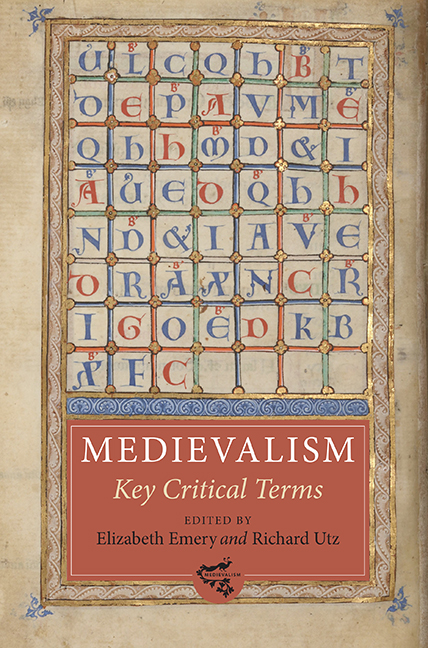Book contents
- Frontmatter
- Dedication
- Contents
- List of Illustrations
- List of Contributors
- Making Medievalism: A Critical Overview
- 1 Archive
- 2 Authenticity
- 3 Authority
- 4 Christianity
- 5 Co-disciplinarity
- 6 Continuity
- 7 Feast
- 8 Genealogy
- 9 Gesture
- 10 Gothic
- 11 Heresy
- 12 Humor
- 13 Lingua
- 14 Love
- 15 Memory
- 16 Middle
- 17 Modernity
- 18 Monument
- 19 Myth
- 20 Play
- 21 Presentism
- 22 Primitive
- 23 Purity
- 24 Reenactment
- 25 Resonance
- 26 Simulacrum
- 27 Spectacle
- 28 Transfer
- 29 Trauma
- 30 Troubadour
- Index
- Medievalism
17 - Modernity
Published online by Cambridge University Press: 08 October 2022
- Frontmatter
- Dedication
- Contents
- List of Illustrations
- List of Contributors
- Making Medievalism: A Critical Overview
- 1 Archive
- 2 Authenticity
- 3 Authority
- 4 Christianity
- 5 Co-disciplinarity
- 6 Continuity
- 7 Feast
- 8 Genealogy
- 9 Gesture
- 10 Gothic
- 11 Heresy
- 12 Humor
- 13 Lingua
- 14 Love
- 15 Memory
- 16 Middle
- 17 Modernity
- 18 Monument
- 19 Myth
- 20 Play
- 21 Presentism
- 22 Primitive
- 23 Purity
- 24 Reenactment
- 25 Resonance
- 26 Simulacrum
- 27 Spectacle
- 28 Transfer
- 29 Trauma
- 30 Troubadour
- Index
- Medievalism
Summary
MEDIEVALISM IS SELF-EVIDENTLY a modern invention. One cannot have a middle without two ends, and the very phrase “the Middle Ages” implies a prior and a later period to frame those ages. The nature of European and American childrearing over many centuries further implied, very strongly, an earlier period of classical civilization which had produced the Latin and Greek texts which formed the basis of young male education and a later contemporary period which posed itself as a successor to that period. The time in between was inevitably seen as a trough between two peaks. Whether that perception was correct remains contested, both by historians and in popular awareness.
One may say that “medievalism,” in the modern sense, began when that perception began to be contested. The immediate point, however, is that no literary work of medievalism can avoid some interaction with modernity. Literary medievalism, and movie medievalism as well, must always be in some sense contrastive, if only because the reader is aware of his/her own surroundings.1 Every writer, of course, finds his/her own way of dealing with this, and multiple ingenuities may make it impossible to frame any wholly satisfactory general categorization of modernity in medievalism. Some generalizations may, however, be put forward as a first suggestive stage.
Three factors seem to be strongly involved in determining an author's interaction between the modern and the medieval. The first is, very evidently, the author's own attitude to the medieval: at one extreme, contemptuous, at the other, adulatory. A second factor is the author's attitude to his/her imagined readers: at one extreme superior, hortatory, ready to deliver information not expected to be challenged, at the other, tentative or ingratiating. A third factor, rather harder to assess, but of particular importance in movie medievalism, is the author's relationship to the well-developed general awareness of “the medieval imaginary,” in which crusaders, friars, Robin Hood, Normans and Saxons, and much else, exist in a permanent anachronistic stew.
One can indeed imagine a three-dimensional model of modernity in medievalism, with factor 1 above occupying the horizontal axis, factor 2 the vertical, and factor 3 at 90 degrees.
- Type
- Chapter
- Information
- Medievalism: Key Critical Terms , pp. 149 - 156Publisher: Boydell & BrewerPrint publication year: 2014

